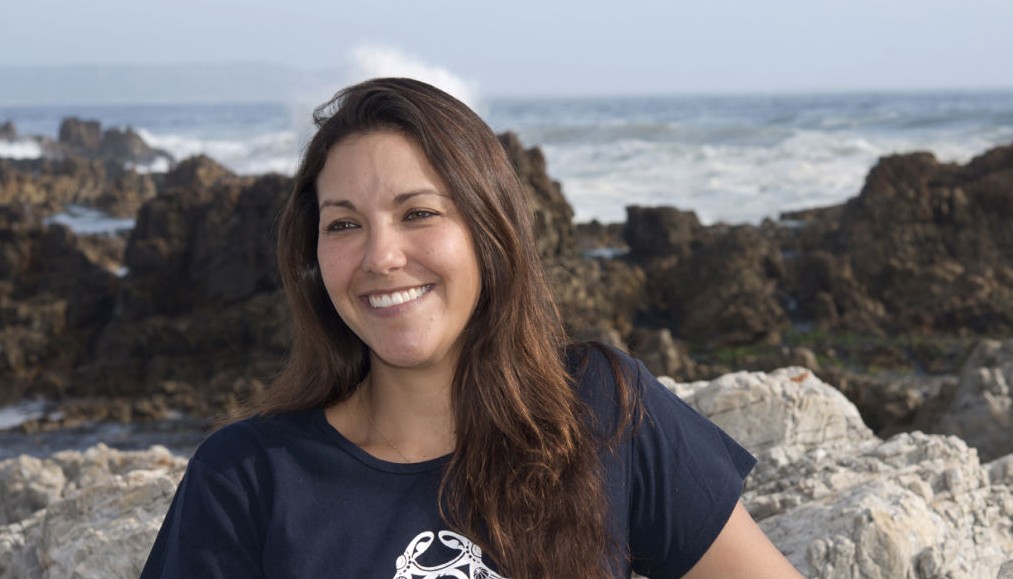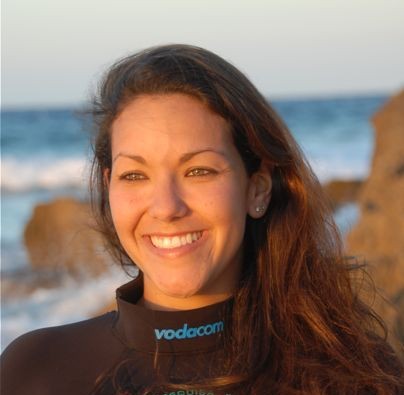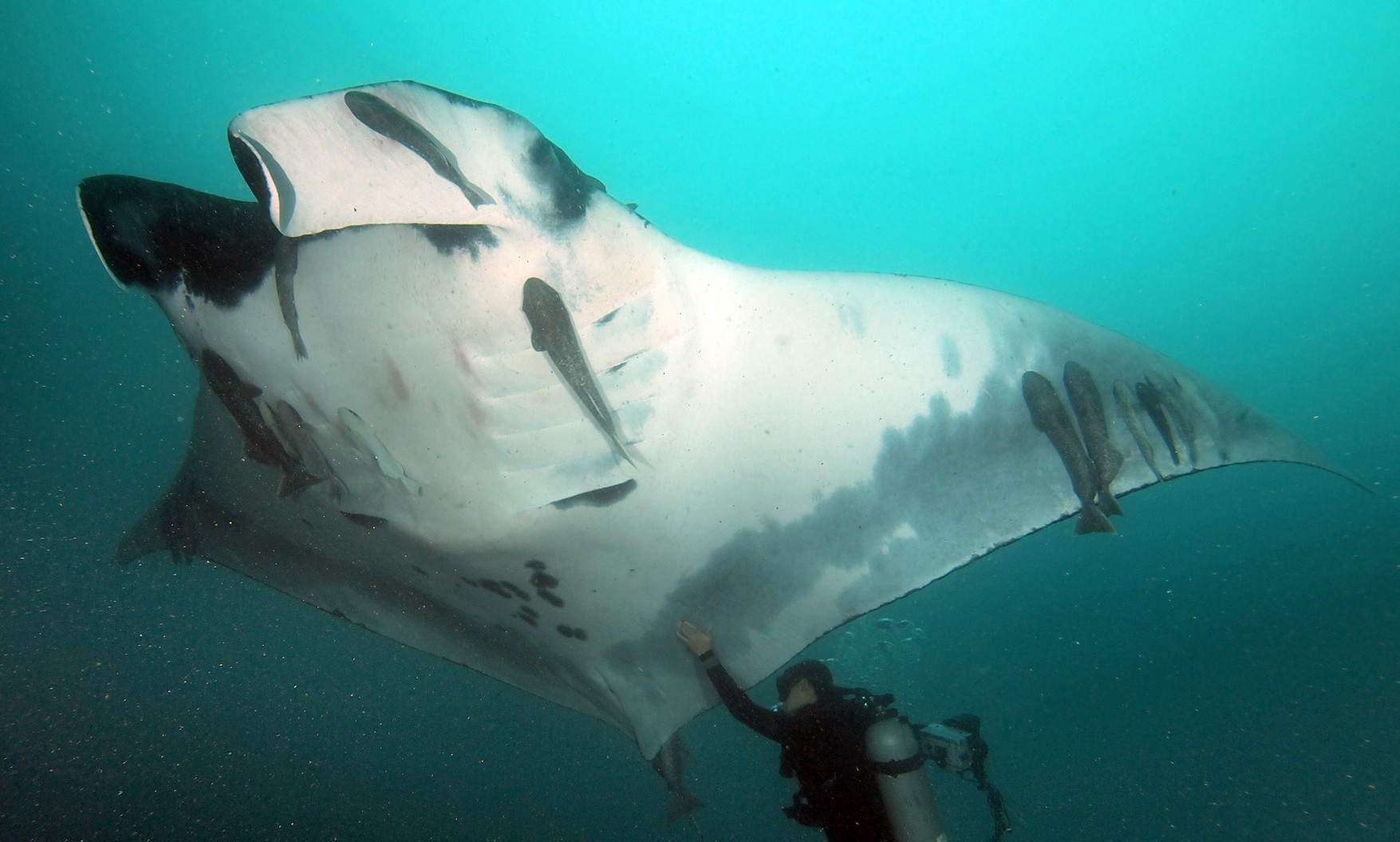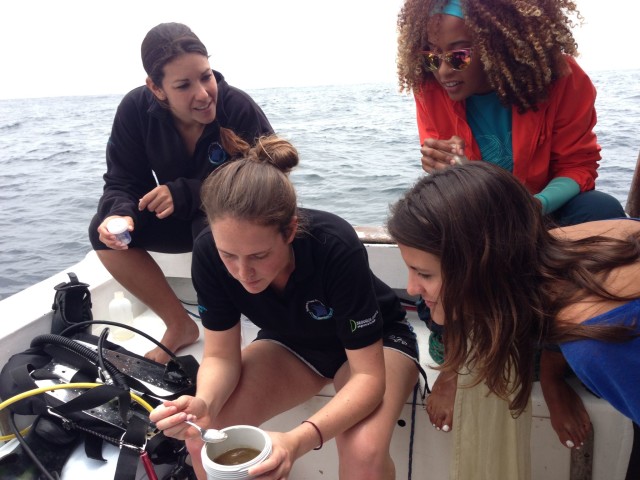Marine Life & Conservation
Amazing Women: Andrea Marshall, A Conservation Pioneer

Dr. Andrea Marshall is one of the leading marine scientists and pioneers of our time. Growing up in California, she learned to dive at age 12, and like many marine enthusiasts, her first interest was in shark conservation. On a vacation to Mozambique Andrea discovered a stunning aggregation of manta rays off the eastern African coast. There had virtually been no research on these incredibly large and charismatic animals, and Andrea was fascinated by the friendly giants. She was the first person to earn a PhD by studying Manta Rays, and she has become a force to be reckoned with in her passion to study and to protect these animals. When she speaks, people listen, and they are beginning to act.
How could I begin to list her accomplishments? As I said, she was the first person to earn a PhD by studying Manta Rays. She also discovered that there were actually two species of Manta, Manta Birostris (the Giant Manta), and Manta Alfredi (the Reef Manta). In photographing and observing the mantas she began to discern identifying marks on their bellies. No two Mantas have the same spot pattern, so she kept a database with ID photos so the Mantas could be compared and recognized. Those photos can be matched with other mantas anywhere on the planet by uploading them to Manta Matcher, an automated database of ID photos of Mantas. These ID’s give researchers data on the migratory patterns and behaviors of the mantas. After a BBC documentary on her work, she became known as The Queen of Mantas. As one of the founders of Marine Megafauna Foundation and its CEO, Andrea continues to research and catalogue her data on Manta Rays all over the globe. And I do mean, all over the globe. From Africa to the Maldives to Indonesia to Ecuador and Mexico….the list goes on and on.
 The documentary about her work in Mozambique was compelling. I had seen Mantas from a distance, and had always been fascinated by them, but when I was little we were called out of the water so the Devil Fish wouldn’t swallow us whole (of course, they wouldn’t, they are so gentle). Her research on Mantas lingered in my mind, and when I had the opportunity to do a volunteer month in Tofo, Africa (with All Out Africa) to research Whale Sharks with her co-founder Dr Simon Pierce, I jumped at the chance.
The documentary about her work in Mozambique was compelling. I had seen Mantas from a distance, and had always been fascinated by them, but when I was little we were called out of the water so the Devil Fish wouldn’t swallow us whole (of course, they wouldn’t, they are so gentle). Her research on Mantas lingered in my mind, and when I had the opportunity to do a volunteer month in Tofo, Africa (with All Out Africa) to research Whale Sharks with her co-founder Dr Simon Pierce, I jumped at the chance.
The coast along Mozambique is beautiful, and almost untouched. However, there were some harsh realities in Tofo I hadn’t prepared myself for. By the time I arrived in Tofo, 88 percent of the Mantas were gone, mostly due to unsustainable fishing practices. When heading out to dive, or coming in from a dive, our group often saw boatloads of sharks and rays being butchered right on the beach. The fins were being sold (and are being sold) to China, to end up in Chinese medicines and Shark Fin Soup (a really disgusting soup of chicken broth and fibers from shark fins.) Even though the Chinese government no longer serves Shark Fin soup at government dinners, the Chinese are still the number one consumers of endangered sharks and rays. I saw more dead sharks and rays on shore and in the square than I saw in the water. These experiences made me want to help, and I am a supporter of the Marine Megafauna Foundation in several ways. I have a Manta Ray in Mozambique I “adopted” (the funds go for research), and I named her Daenerys Targaryen, Stormborn, Queen of the Andals and the First Men, of the Rhoyne and the Seven Kingdoms, the Unburnt, and Mother of Dragons. Of course, I call her Daenerys and not by her full title (anyone who loves Game of Thrones knows what I am talking about). There are many ways to support the Marine Megafauna Foundation, so check it out!
I also went to Marine Megafauna Ecuador last year with Andrea and her team to photograph and observe Mantas. Marine Megafauna offers great expeditions so people like me can perform citizen science, and help in the conservation of marine life (or at the very least, to feel like I’m helping). Andrea and her husband, Janneman Conradie, are a friendly and unassuming couple, and working with them was easy and exciting. They are both focused on the conservation of these animals (I have written blogs about my adventures in Ecuador, you can read them here). I am scheduled to go on many more expeditions, and I wish I could go back to Ecuador this year. However, my daughter is getting married, so I’d better stick around for the wedding. It would be rather bad form to miss it!
Andrea is a National Geographic Emerging Explorer 2013, and has done an expedition with Ocean GEMS – Go Explore Marine Science for girls. What a terrific role model for our young girls! Andrea proves the point eloquently that females can do anything they want to do. Her passion has inspired many to care about the fate of not only Mantas, but of sharks and other rays as well. In the quest to stop the eradication of the species, the MMF team were instrumental in helping pass CITES Appendix II (Convention on International Trade in Endangered Species), “an unprecedented precautionary approach to avoid the over-exploitation of one of the world’s most exquisite marine animals.” In addition, Indonesia has been convinced that a manta ray is 2,000 times more valuable alive than dead. To quote Andrea’s blog, “Realizing the non-consumptive and perpetual economic value of manta rays, Indonesia has now declared that manta rays will be protected in their waters. Not only has this country committed to a ban on the fishing of mantas throughout its entire exclusive economic zone, but at the same time they make history by creating the world’s largest sanctuary for the iconic rays, encompassing 6 million square kilometers.” Following on the heels of CITES and Indonesdia, The Convention for Migratory Species CoP in Quito, Ecuador protected several species of rays and sharks in September 2014. The tide is beginning to turn, and Indonesia has recently made its first 3 arrests of manta ray part traders. The enforcement of the Indonesian ban will be instrumental in showing the world that they are serious about protecting these valuable animals.
This Amazing Woman has inspired a wave of conservation efforts in many parts of the world. Scuba Diver Life recently did a wonderful profile on Andrea and her life’s work, and there are several other profiles about Andrea and Marine Megafauna Foundation. As I am taking part in PRI and SheKnows Media’s campaign ACROSS WOMEN’S LIVES, Andrea sets a strong example of a woman living her life to the fullest.
For more information, check out Marine Megafauna Foundation, and see what you can do to help. I can tell you from experience that this group is a worthwhile investment.
Marine Life & Conservation
Paul Watson Released as Denmark Blocks Japan’s Extradition Bid

Renowned anti-whaling activist Paul Watson has been released from custody in Greenland after spending five months in detention. Denmark’s Justice Ministry rejected Japan’s request for his extradition, citing insufficient guarantees that his time already served in custody would be credited against any potential sentence.
The 74-year-old Canadian-American was arrested on July 21 in Nuuk, Greenland’s capital, when his ship docked to refuel. His arrest was based on a 2012 Japanese warrant related to a 2010 encounter in Antarctic waters. Japan alleged Watson obstructed operations and caused damage to a whaling research ship during efforts to disrupt illegal whaling. Watson has consistently denied these claims, maintaining his commitment to marine conservation.
Denmark, which oversees extradition matters for Greenland, concluded that while the legal conditions for extradition were met, the lack of assurances from Japan regarding time-served credit made extradition untenable.
In a video shared by his foundation, Watson expressed gratitude and relief, saying, “After five months, it’s good to be out… and good to know they’re not sending me to Japan.” He added that the most difficult part of his time in custody was being separated from his two young sons.
Watson is a pioneering figure in marine conservation, known for founding the Captain Paul Watson Foundation in 2022 after decades of activism with the Sea Shepherd Conservation Society. His bold efforts to defend marine life have earned him widespread support, including from celebrities and conservationists. His work has also been featured in the acclaimed reality TV series Whale Wars.
Watson’s lawyer, Jonas Christoffersen, praised the decision, stating, “We are happy and relieved that Paul Watson is now free.” He added that Watson is eager to reunite with his family and continue his vital work.
The arrest occurred while Watson’s vessel, the M/Y John Paul DeJoria, was en route to the North Pacific with a team of 26 volunteers to intercept a Japanese whaling ship. His foundation described the arrest as politically motivated and emphasized that Watson’s actions were focused on ending illegal whaling practices.
Japan resumed commercial whaling in 2019 after leaving the International Whaling Commission, asserting that whale meat is a cultural tradition. Conservationists, however, continue to challenge these practices, highlighting their impact on marine ecosystems.
Despite the challenges, Watson remains steadfast in his mission to protect marine life and bring attention to whaling practices. His dedication to ocean conservation has made him a globally respected advocate for the environment.
Marine Life & Conservation
12 Days of Zero-Waste Fish-mas

This holiday period, the Marine Conservation Society, the UK’s leading ocean membership charity, invites you to make some simple changes to eating fish this Christmas to help our seas.
Dr Kenneth Bodles, Head of Fisheries and Aquaculture at the Marine Conservation Society, said, “During the festive season, our consumption increases, but so does waste. Sustainability isn’t just about where food comes from – it’s also about how you use it. By reducing waste and making the most out of your seafood, you’re not only taking steps to be more ocean-friendly, but can also help to cut costs during what is often one of the most expensive times of the year”.
The Marine Conservation Society has compiled twelve tips on how to consume seafood sustainably with zero-waste this Christmas:
Buy whole fish instead of fillets
Instead of fillets, consider buying whole fish such as salmon, hake, or lemon sole. By adopting a “nose to tail” approach with cooking, whole-baked fish not only feeds a crowd, but also helps to minimise waste and maximise sustainability by using up every part of the animal, including bones, skin, and fat.
Make fish stock
Leftover fish bones or shells can be put to good use by boiling them to make a nourishing fish stock or bisque. This can be frozen and preserved for later use and makes for a flavourful base in a soup.
Make your own fish pâté
Avoid waste by turning leftover fish, such as smoked mackerel or salmon, into a delicious pâté by blending with cream cheese and lemon. Perfect when paired with crackers.
The sustainability of salmon and mackerel varies depending on where and how it is caught or farmed. For more information on green-rated options, check the charity’s Good Fish Guide.
Buy frozen
By purchasing seafood that is frozen or vacuum-packed, this helps to reduce waste by extending the shelf life of your food.
Fish pie
If you’re wondering what to do with leftover cooked fish, why not opt for a classic fish pie with mashed potatoes, leeks, and a cheesy sauce? A sure crowd pleaser on Boxing Day.
Use the head
Don’t forget the fish head! The meat is incredibly tender and flavourful. The charity recommends a cod’s head curry or recreating Fallow’s renowned cod’s head in siracha butter.
By stretching your ingredients further, not only is this a more sustainable way to enjoy seafood, but also cost-effective by repurposing leftovers and cooking creatively.
Boxing Day brunch
Mix leftover kippers or smoked salmon with scrambled eggs for a tasty, zero-waste, Boxing Day brunch.
For best choice, make sure you buy kippers, or herring, from the North Sea and the North Irish Sea.
Zero-waste storage
A top tip from the Marine Conservation Society to avoid waste is freezing fish offcuts to save for future use.
Crisp up the skin
Even leftover fish skin can be turned into a quick savoury snack by crisping it up in an air fryer with a little olive oil and salt.
Anchovies two ways
Leftover anchovies can either be blended with butter to make a delicious anchovy butter or tossed into pasta for a hit of umami flavour.
The charity recommends opting for anchovies caught in the Bay of Biscay for best choice.
Fishcakes
For an easy, zero-waste meal, leftover seafood trimmings can be mixed with mash and fried in breadcrumbs to make fishcakes.
Pickled mussels
Try pickling mussels in 1:1 vinegar and water, with a dash of sugar for a sustainable, zero-waste snack that can be enjoyed well beyond the festive season.
Mussels farmed in the UK are a seafood superhero. Grown using low-impact methods and harvested by hand, they get all the food they need from the sea around them. This makes them one of the most sustainable, ocean-friendly, and cost-effective seafood options.
Players of People’s Postcode Lottery have raised £6.6M towards the Marine Conservation Society’s vital work in making seafood more sustainable.
Laura Chow, Head of Charities at People’s Postcode Lottery, said: “Fish is a festive favourite for many, but making sustainable choices when it comes to how we buy and eat seafood makes all the difference for our ocean. Support from players of People’s Postcode Lottery has helped the Marine Conservation Society further its sustainable seafood work, so that we can all enjoy healthier, better protected seas.”
The Marine Conservation Society encourages you to make sustainable seafood choices a year-round habit, not just for Christmas. To check how sustainable the seafood on your plate is, you can visit the charity’s Good Fish Guide. The Guide helps consumers and businesses identify the most sustainable seafood using a simple traffic light system, based on where and how species are caught or farmed. Green is the best choice, amber means improvements are needed, and red indicates fish to avoid buying.
Zero-waste gift idea
Why not embrace a zero-waste Christmas by gifting a membership to support marine conservation? It’s a meaningful, low-waste gift that helps protect our ocean for generations to come. Memberships start from as little as £5 a month – the price of a sandwich and drink from your local coffee shop.
Find the latest sustainable seafood advice for wild-caught and farmed seafood on the Good Fish Guide, downloadable to your phone from www.mcsuk.org/goodfishguide.
-

 News2 months ago
News2 months agoIconic SS United States to become the World’s Largest Artificial Reef
-

 News3 months ago
News3 months agoBook Review – 52 Assignments: Underwater Photography
-

 Gear News3 months ago
Gear News3 months agoDYNAMICNORD – New German diving brand enters the British market
-

 News3 months ago
News3 months agoExploring Cenote El Pit: A Diver’s Dream
-

 Marine Life & Conservation3 months ago
Marine Life & Conservation3 months agoBook Review: Coral Triangle Cameos
-

 Blogs3 months ago
Blogs3 months agoDive the Egyptian Red Sea this Autumn with Regaldive
-

 News3 months ago
News3 months ago2024 Ocean Art Underwater Photo Competition Announced
-

 Gear News3 months ago
Gear News3 months agoFourth Element Launches Pelagic Dive Watch





